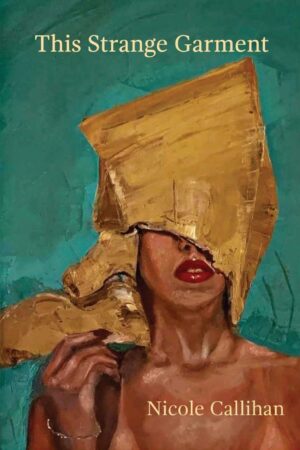This Strange Garment
by Nicole Callihan
reviewed by Nadia Colburn
I read Nicole Callihan’s new book the day I got back from a meditation retreat. After retreat, everything is heightened: sounds, smells, tastes, colors, the ordinary hum of ordinary life with its comings and goings—everything seems more acute. This Strange Garment was the perfect book to read in this state. Situated firmly in the physical world, it reminds us of what is important; even “vats of French onion dip” or “a green fly on the blue cheese” have a new luminosity seen through Callihan’s eyes.
This Strange Garment is written from the perspective of someone navigating breast cancer through the pandemic, and there are poems about tests, treatments, a mastectomy. But it is not a book about cancer; it’s a book about being alive. Callihan writes about the strangeness and wonder of human experience, about paying attention to all those things that we normally don’t pay attention to, about being present, while one can.
The first poem in the book is a good example. The title, “Everything is Temporary,” is taken from a refrain the speaker repeats to herself in the MRI machine and throughout her day:
Even the patriarchy, and my White Claw, and the crane’s flight, and the machine still beeping in my brain, the pretty red mesh of the bandage where the IV was inserted, the clouds crossing the train’s window, the train, the window, even the beautiful expanse of river that has finally opened to me . . . even the searching, the reaching, the naming. Even those. Even this, temporary.
As she writes in another poem, “I’m in the hum of the machine forever. And then I’m out.” Even forever ends—as anyone who has been through illness is reminded.
So much of humor depends on strange juxtapositions, and Callihan is good at showing us both the serious and the absurd and how they are related. The speaker recalls the way she used to imagine the Sweet’N Low that she put into her Matcha exploding and wonders whether it did, in fact, explode into cancer. As she thinks back on her own mistakes, she realizes that even the air—“just walking around breathing”—might kill us. Each of us is part of this absurdly complex system, with its dangers and supports.
And to get through yet another MRI, she tells herself jokes with the refrain “Radiant Healing Light.”
Horse walks into a bar with a Camel hanging from his mouth. Bartender says, Need . . . A . . . Healing . . . Radiant . . . Light . . . How many women does it take to screw in a healing, radiant lightbulb? One.
What is radiant, Callihan recognizes, is not only what supports but what might kill us: the MRI machine, the cancer treatments, the air itself. And it is the one woman, alone in the machine, making up jokes to herself, writing poems, trying to stitch together the incongruencies of the world, who sees and feels—and narrates—the complexity of the experience, and thus makes sense of it all.
For Callihan, a poem becomes the space to hold all the strange contradictions of life, including, perhaps most importantly, the contradictions of the body itself, which is also “temporary.” The book is ultimately a tribute to the female body, a body with breasts, even those that have been cut off, with nipples, even those resewn, with a belly button, and menstrual blood—all of which are described with a mix of specificity, respect, beauty, and humor.
What holds the body is, in part, language, this other strange garment that we put on. As Callihan writes in the afterword: “Navigating illness is difficult at any time, but navigating illness during a pandemic felt particularly onerous. Being able to write poems while navigating that illness was a gift.”
The book’s title poem, the last in the volume, ends with a haunting image:
What comes after the after? A blouse
on the doorknob, the hush.
After the after the garment will be filled with emptiness; but before the after, we get to fill that blouse with our bodies the best we can.
Published on October 24, 2023

